#oracles prophesies
Explore tagged Tumblr posts
Text
hey babe, love love love that we're destined to fall for each other in every timeline! super hate that you're destined to die tragically in my arms, though. can you cut that out? it's kinda one of my boundaries. yeah, sorry :/
22 notes
·
View notes
Text
Direct Vision Spell for an Oracle 𓂀
A 2000 year old Greco-Egyptian magic spell

─── ⋆⋅☆⋅⋆ ──
[PGM V 54 – 69]
So sick of all these fake bs Tumblr and Pinterest spells-
"what color candle means what lol" with zero cultural or historical significance, it's like they just pulled things out of their ass.
So, here is a real 2000 year old Greek and Egyptian syncretic spell from Thebes to receive a direct vision from the beyond....WITH cultural and historical context.
Because, yes, history is important, and anyone giving you "spell tips" without telling you where the fuck they're from or what they mean is bullshitting you.
Ancient Greek oracular spells were rituals and invocations performed to gain insights or predictions from the gods, the Theoi, as well as Daemons and the Dead, particularly through seers known as oracles.
The Spell: PGM V 54 – 69 from the Greek Magical Papyri
Context of the Spell:
This spell is an interesting blend of Egyptian and Greek oracular practice: the use of Coptic or Egyptian eyepaint, kohl, here is interesting– as well as it's mixture with water from a sunken ship. Water from such locations are normally reserved for love spells, as we see previously in the PGM. The relationship or correspondence between a literal sunken vessel and sinking into the throes of passion. However, here, with its use in an oracular spell, it seems to correspond more to the chthonic or otherworldly realm, giving te wearer the ability to see past the normal, mundane world; past the ‘veil’ so to speak and into the beyond.
The use of the magical mystery word or voces magicae “Akrammachamarei” here is also notable; it is quite often seen throughout the PGM, and is associated with the God/Daemon/Archon of both Gnostic (Jewish-Egyptian) as well as Greek origin, Abrasax.
In spell PGM V. 96-172, Abrasax is identified as part of the "true name which has been transmitted to the prophets of Israel" of the "Headless One, (also known as the Egyptian god Bês) who created heaven and earth, who created night and day ... Osoronnophris whom none has ever seen ... awesome and invisible god with an empty spirit"; the name also includes Iaō and Adōnai, the ineffablenames of the Jewish god. "Osoronnophris" represents Egyptian Wsir Wn-nfr, or "Osiris the Perfect Being.” Another identification with Osiris is made in PGM VII. 643-51: "you are not wine, but the guts of Osiris, the guts of ... Ablanathanalba Akrammachamarei Eee, who has been stationed over necessity, Iakoub Ia Iaō Sabaōth Adōnai Abrasax."
Instructions:
─── ⋆⋅☆⋅⋆ ──
After you have purified yourself (through ritual bathing and declarations) you must put on your clean linen robes and sandals of Papyrus.
Then, taking a purified bronze censer, place the laurel leaves inside and light them until the smoke fills the room. Walk clockwise around the room, and your workspace, Chanting the Ephesia Grammata:
ΑΣΚΙ(ΟΝ) ΚΑΤΑΣΚΙ(ΟΝ) ΛΙΞ ΤΕΤΡΑΞ ΔΑΜΝΑΜΕΝΕΥΣ ΑΙΣΙΟΝ (or ΑΙΣΙΑ)
“askion kataskion lix tetrax damnameneus aision”
Then, taking the olive oil, pour it into the waiting bronze dish.
With your right hand, anoint your right eye with the prepared water from a shipwreck.
With your left hand, mix 1 part kohl with 1 part water until it is a viscous paint, from the same dish, and anoint your left eye so that it is completely surrounded by the paint.
Then, pronounce the incantations:
"EEIM TO EIM ALALĒP BARBARIATH / MENEBREIO ARBATHIAÔTH IOUĒL IAĒL OUĒNĒIIE MESOMMIAS,
let the god who prophesics to me come and let him not go away until I dismiss him,
OURNAOUR SOUL ZASOUL / OUGOT NOOUMBIAOU THABRAT BERIAOU ACHTHIRI MARAI ELPHEŌN TABAŌTH KIRASINA LAMPSOURĒ IABOE ABLAMATHANALBA AKRAMMACHAMAREI.”
Once the incantations are finished, present any offerings and ask over the prepared olive oil dish what your question(s) are. Stare into the oil, lit only by candle or oil lamp light, and you will receive a direct vision.
─── ⋆⋅𓂀⋅⋆ ──
For more information & how to pronounce the incantations, check here.
#chthonic sorcery#greek sorcery#sympathetic magic#ancient egypt#ancient history#ancient greece#greek magical papyri#pgm#coptic#Goêteia#oracle#visions#spellwork#spells#spell tips#witch tips#witchblr#witch community#Abrasax#gnosticism#anthropology#divination#divination spell#traditional witchcraft#Greco-Egyptian polytheism#oracles#greek oracle#prophesy#oracle of delphi#incantations
105 notes
·
View notes
Text
White people on this stupid app immediately jumping to victimizing themselves bc the mean negroes think it’s weird how quickly they began to obsess over and infantilize the white man who killed an entire community of black people is actually exactly what’s wrong with fandom space, but it’s probably not that deep and I’m probably just trying to stop you guys from having fun
#sinners#honestly#like the guy all you want but watch your damn tone#it’s a pattern of behaviour at this point#I feel like the fucking oracle of Delphi bc I know exactly how they’re going to woobify him#I prophesy
6 notes
·
View notes
Text

The mother of the dark feminine goddess
4 notes
·
View notes
Text
Keepers of the Veil
We are the witness of the age The wanderer in the light Where darkness fell away And shadows linger no more We are the hidden hand The motion of all passages Where creatures crawl in search Ever blinded by their greed We are the unknown host The life within the life Walking freely amongst men Too occupied to see the truth We are the forgotten line The masters of the ancient rite Named a name of…
#Ancient Knowledge#Ancients#Awakening#Divine Purpose#Eternal Truth#Hidden Wisdom#History#Light and Darkness#Mystery#Oracle#Prophesy#Spirituality#Watchers#Witness
0 notes
Text
modern day oracle where you have to sign 50 million forms saying you will not do anything to either ensure or prevent the events of the prophecy from happening
#i think it would help#fiction#i did base this on the oracle of delphi#where you had to do like 50 microtransactions before they told you what the prophesy even was
1 note
·
View note
Text
You can really tell who hasn't read the Odyssey when they say it's Athena's fault that everything happened. They say if Athena didn't intervene in Remember Them none of it would've happened.
First off, in the Odyssey Athena doesn't appear(because she trusted Odysseus to get home), and guess what? Without Athena intervening at all Odysseus reveals his name. Her intervening does nothing to Odysseus revealing his name. He was gonna do it anyways.
Second, Odysseus was prophesied to not make it home until 20 years later. That's why he pretended to be insane because he learned he couldn't be home for 20 years. He went to the oracle and found it out.
This is simple knowledge if you read the Odyssey. Also this is a Greek TRAGEDY he's doomed by the narrative. I beg of you don't point and blame without reading the source material.
#epic the musical#athena#epic athena#odysseus epic#odyssey#greek mythology#odysseus#epic the musical cyclops saga#read the odyssey#i beg of you
77 notes
·
View notes
Note
What about a Yandad! Poseidon with his mortal/ demigod daughter??
❝ 🌊 — lady l: I got carried away and ended up writing a mini imagine. This is not canon and is based on the voices in my head lol, but I hope you like it and forgive me for any mistakes! 💙
❝tw: threats and a slight yandere!Poseidon, but other than that, nothing else.
❝🌊pairing: platonic yandere!poseidon x daughter!reader.
❝word count: 683.
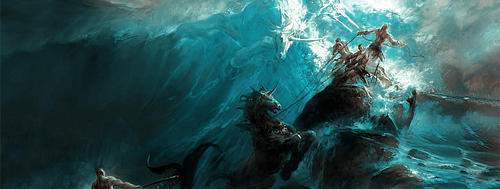

You grew up at Camp Half-Blood, surrounded by other demigods and learning to control your divine powers. Your relationship with Poseidon was complex; on the one hand, you benefited from his protection, but on the other, the shadow of prohibition hung over you. The sea god, your father, had a clear interest in your fate, and the other demigods couldn't help but feel the aura of power that surrounded you.
Your relationship with Percy Jackson, the already known hero and son of Poseidon, was a highlight. The two half-sibilings trained together, shared experiences, and supported each other in battles against monsters and other threats. The bond between them grew, consolidating a formidable partnership, feared by many enemies. Poseidon was more than pleased to see his two favorite children get along so well.
In the years that followed, Poseidon's presence in his daughter's life was constant. He guided you in training, sharing secrets of the seas and teaching you how to control your aquatic powers. As time passed, your abilities stood out among the rest. Poseidon's influence ensured that the instructors at camp also paid special attention to you, preparing you for even greater challenges. However, the constant gaze of the god of the sea also generated distrust among your fellow demigods, fueling rumors and jealousy.
Life at Camp Half-Blood wasn't easy. Monsters constantly threatened the perimeter, and quests were often assigned to the most skilled demigods. Poseidon, in turn, began to discreetly intervene in your life, providing help at crucial moments and ensuring you were one step ahead of impending dangers.
However, your relationship with the sea god was not just one of benefits. In dreams and visions, you began to receive cryptic messages and warnings from other gods and titans, warning you of the implications of being so close to Poseidon. A god can never be involved in his children's lives, well, the demigods children at least.
Tension between the gods grew as your bond with Poseidon deepened. Zeus, in particular, viewed the increasing influence his brother had over you with suspicion. The warnings from the other gods increased, and the shadows of destiny began to manifest themselves more clearly.
One night, during a vivid dream, Triton, the son of Poseidon with his wife and your half-brother, appeared before you. His eyes expressed concern as he warned of the consequences of ignoring divine warnings.
"Proximity to our father can bring blessings, but also curses," Triton said, his voice echoing like the waves of the sea.
Quests abroad became more dangerous, with more powerful monsters and mythological creatures challenging the demigods. Poseidon continued to intervene subtly, but now his help was under the scrutiny of the Olympian gods. Zeus, in his wrath, explicitly prohibited any divine intervention in your quests.
Once, during a battle against a colossal sea beast, you found yourself on the brink of defeat, your companions also injured. Desperate, you silently cried out for Poseidon's help. He responded, sending a furious wave to defeat the monster, but the price of this intervention was high. On Olympus, Zeus' anger became uncontrollable.
The situation reached a critical point when an oracle prophesied that the proximity between Poseidon and you would trigger a catastrophe that would affect not only the demigods, but the entire balance of the mythological world. The gods' prohibition on interfering in the lives of their children became an unbreakable decree.
Poseidon, however, didn't care one bit. You were his daughter and he would help you if he wanted.

#percy jackson#pjo#percy jackson and the olympians#yandere percy jackson#yandere pjo#platonic poseidon x reader#yandere poseidon#platonic yandere#platonic yandere poseidon x reader
1K notes
·
View notes
Text
you the garden and the,
grave


aka. the ever expanding list of lives i want to live . i’m having fun!!!!!!!!!!!!!!!!!!!!111111!!!


. . . a triptych for the death of pride
█ hogwarts………….. pureblood, historian, seer, slytherin. a time traveling witch. my boyfriend is obsessed with immortality. we’re mad scientists with magic. my best friend is alice fortesque. i grow oranges and scare lucius malfoy as a past time.
𓇕 ╱ my love . tom riddle
𓊈 𓆙 𓊉 i will be great, or nothing: introduction
༝ ‘i’m so cool' she says, a literal fucking loser.
༝ restricted sections ask game.
༝ hozier: self titled ask game.
༝ pin board.


. . . her name means heavy
█ pjo……………………. a daughter of dionysus born more god than mortal, prophesied to ascend. the girl percy jackson is swooning over. she’s due a traipse across tartarus and a completion of a great prophecy.
𓇕 ╱ my love . percy jackson
༝ not an intro but…… it'll do.
༝ the garden shifting ask game.
༝ percy x anäis but we haven't even talked yet.
༝ luke: i loved you like a brother.
༝ pin board.


. . . for she is lady spring, who brings forth life
█ star wars…………… runaway jedi knight, divine feminine, can create life out of her hands, lowkey plantsim vibes. i pulled an ex-queen and her loyal puppy by being a gardener.
𓇕 ╱ my loves . padmé amidala and anakin skywalker.
𓊈 𓉳 𓊉 lady spring: introduction
༝ pin board.


. . . everywhere there is peace
█ dune…………………. illegitimate daughter of duke leto. priestess//keeper of the temple to the ancient gods in caladan. bene gesserit with her own agenda. descended from achilles pelides himself. seer, divine, schemer. the saying “plan within plans” was made for me.
𓇕 ╱ my love . tom riddle
𓊈 ⛰︎ 𓊉 the oracle: introduction
༝ pin board.


. . . i know something of evil
█ vampire & witch… witch of the nomadic huns. turned immortal after a laborious day of tracking down animals to eat and herbs to dry, she is to live thousands of years. it is on a fateful day that she finds her closest friend in the same predicament as her, turned and left behind—dazed, confused and retching, and hates herself as she sighs in relief, for she now knows she isn’t doomed to live an eternally lonely life.
𓇕 ╱ my love . duru [censored]
𓊈 𓏲𝄢 𓊉 blood of my blood: introduction
༝ pin board.




. . . a masterlist of others
█ better cr pt1: her style. pin board.
█ third hogwarts: always: introduction.
█ golden trio: homemade dynamite: introduction. the princess and the frog ask (ps.things have changed since this). pin board.
█ one piece: roronoa zoro's perspective.
█ pirate witch: not an intro, but close enough.
█ zero (cyberpunk): my bar.

& much more to be added whenever i feel like it.
#user girlberrie of tumblr introduces herself#sam's drs#reality shifting#desired reality#shifting blog#anti shifters dni#shifting antis dni#shifting#shiftblr
59 notes
·
View notes
Text
A decent chunk of my intrusive thoughts are visual, which makes me feel like the world's worst oracle, prophesying disasters that straight up aren't going to happen
207 notes
·
View notes
Text
//the last olympian spoilers
feeling sick thinking about grover frantically playing the pipes up on olympus. annabeth isn't moving. he's sworn to protect her. luke is fighting his friends, and he is sworn to protect him too, but he's already failed. get them back to camp safely. percy is running at luke now (no, no, you can't let luke get hurt). there's annabeth and luke and a child of the big 3 in front of them and percy is going to die because it is prophesied, not by an oracle but on time folding in on itself, because that's what happens when grover guides halfbloods to camp. get them back to camp safely. annabeth and luke are fighting. they aren't supposed to fight. he has to protect all three of them, but that isn't luke, and annabeth isn't 7 anymore, and percy isn't shaking in the rain screaming for his mother anymore, and if he doesn't let this happen there won't BE a camp to get them safely back to, but every instinct in him is screaming to save them, so he keeps playing, throwing branches and vines through the floor of olympus as it crumbles from the fighting, and no matter how much his lungs hurt he needs to push through, because his charges are there, and he has to get them back to camp safely, and--
#can anybody hear me#ik it might be a bit messy with canon timelines of the fight but bear with me for this#the last olympian#tlo#grover underwood#pjo#grover#luke castellan#pjo!kronos#luke kronos#kronos luke#luke#percy jackson#percy jackon and the olympians#percy#annabeth chase#annabeth#grover percy jackson#percy percy jackson#annabeth percy jackson#grover annabeth percy#percy and grover#annabeth and grover#luke and grover#pjo angst#pjo headcanon
94 notes
·
View notes
Note
hiiiiii like i've wanted to send u a request for like a while and i'm so happy i finally got u
i sadly forgot my og idea buuuuuut luckily i got a new one cus i'm bestie besties with a lurker who is like a friend with a writer cus they know each other irl and cus she gave me a lil spoilie
i wanna use like what i was told for dis request
like ik the thing is about a champion/warrior and their god and like it's a certain king being absolutely PATHETIC for like the first one (like ik my opinion cus i luv pathetic men and like i wanna know ur ideas about this)
like i love the idea of cod boys being a god or champion cus like y'know the smut that can be made
so could i request my second fav boy soap or even ghost being a SIMP like full on worshipping their god after hunting for their pretty
LUV u darlin and like KEEP ON writing because i am GOBBLIN up everything u and my other favs make but make sure u also rest
Cw: God/Champion stuff??, inaccurate Greek mythology, worshipping, offering/gifts/sacrifice, oracle, tell me if I missed any. Note: this reminds me of… the name’s on the tip of my tongue, but I can’t remember exactly who wrote about this before. Could you also send me the @ of your writer friend? I’d like to credit them if possible. And thank you! Just make sure to take breaks in between of reading, yeah? You have to rest your eyes every hour or so.
Johnny couldn’t believe his eyes when he stumbled into this small sanctuary outside the sacred precinct, outside any protective walls and guarded cities. Nestled into the side side of a mountain, the marble stones carved intricately in pretty vines and gentle flowers only to be placed in an isolated place. Away from any travellers and warriors, and hidden away from prying eyes of thieves and charlatans. This little, marble shrine made of white marble, painted murals and gold ordained altar - one of the prettiest he’s seen - was left near forgotten, overgrown with fauna and collecting dust.
And despite that, the statue that stood behind the altar, tall and imposing, curves soft and tunic flattering, the Goddess loomed over him with a shadow of warmth and compassion, much unlike the statues of the ruling Gods and Goddesses he was used to —it was ethereal. Your image was one of love and care, a stark dichotomy to the arrogance and self-importance of Zeus and his siblings. You were welcoming towards him when they spurned him for his foreign appearance: a child of slaves that had bought their freedom, a potent sign of determination and strength.
“Perhaps that Oracle wasn’t crazy,” he gawked at the falling leafage, ribbons of round leaves hiding the entrance, parting like a curtain to the main stage of a theatre.
He had tried his luck with the Oracle of Delphi, in a drunken daze that failed to strip him from his embarrassing misadventures around Delphi’s bars and temple. Johnny had wanted to see what all the fuss was about, the mile long travel many made to see her and her prophesies. He wanted to know if she was a true oracle or a scam, a charlatan like many others, but lo and behold, she was blessed with the sight.
He still remembered her words, her words spoken from the Gods’ whims, giving him the blessing of finding a Goddess he would willingly kneel to, one that would show him the same love and devotion he gave. She foretold that he would meet a Goddess of Health and Hunting that he wanted to worship, a give and take cycle —of life and death. And here he stood, before the statue of a benevolent Goddess he knew he already loved.
You were a minor Goddess, able to gift your champions with totems and blessings, but not a miracle. Your sacred temple was warm, the air filled with the scent of fresh spring and dewy mornings, candles miraculously lit, wrapping the room in a golden embrace that felt akin to a mother’s kiss. Johnny’s eyes wandered around the room, taking it in while he walked to the altar, he stared at the dusty and empty marble, a sad sight for a Goddess so warm.
He searched around his belt, looking around his clothes and padded leather for an offering to wake you up. Something simply - anything - would work, if only to rouse you from your slumber, be it a year or a century long sleep, he would wake you and dub himself your champion. He picked a pelt, an apt offering for a Goddess of Health and Hunting. It was freshly skinned and cured, brushed with care and killed with sympathy. He wasn’t a ruthless killer or an avaricious hunter, he took what he needed and left what he didn’t.
Nodding at the brown pelt, he wiped away the dust that had collected and placed it on the marble, taking care to place it flat and straightened the fur. He took a step back to admire the sight, eyes filled with wonder at the sudden glow, bathing him in a calming light. He felt better, his once aching arms gone, his bruises gone and his strength returned. Waking you had brought a blessing, you had healed him of his aches and pains, restoring him to his peak.
“Welcome,” he heard you whisper, your voice sounding like a bird’s song, pretty and awestricking, “Will you become my champion, dear warrior?”
How could he say no at your sweet plea? You were the warmest being he has ever met, your very essence an embrace full of passion.
“If yer wish me so, Goddess.”
“Thank you,” you chuckled and he’d never felt so lovesick before, his heart so full, yet light.
Taglist: @sae1kie @yeoldedumbslut @bvxygriimes @distracteddragoness @konigsblog @im-making-an-effort @daisychainsinknots @h0n3y-l3m0n05 @danielle143 @tuttifuckinfruttifriday @notspiders @brokenpieces-72 @petwifed @randominstake @haven-1307 @shironasumi @sparky--bunny @bloobewy @cod-z @sweetnanah @aldis-nuts @evolutionarry @kaoyamamegami @cassiecasluciluce
#x reader#cod mw2#cod mw2 x reader#soap mw2#soap mactavish#soap#soap cod#john soap mactavish#soap x reader#soap x you#Champion!soap#Goddess!reader#greek mythology#champion au
106 notes
·
View notes
Text


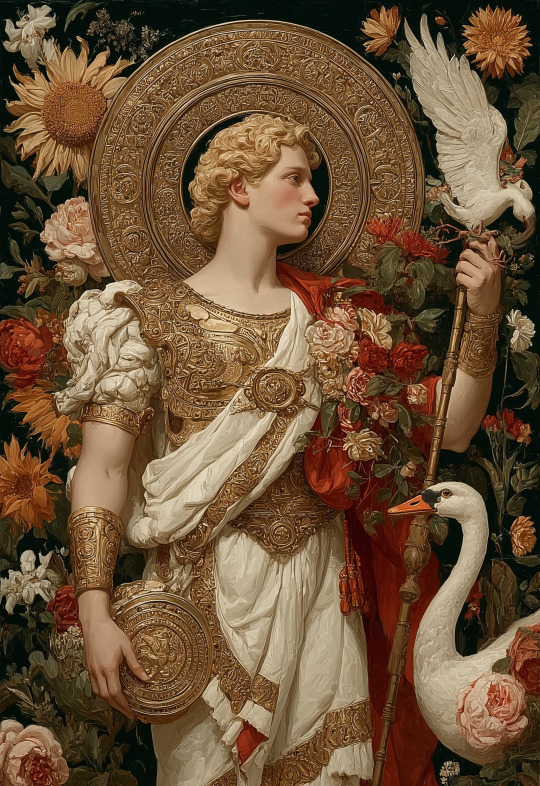
Servant of Delphian Apollo! Go to the Castalian spring; Wash in its silvery eddies, And return cleansed to the temple. Guard your lips from offence. To those who ask for oracles Let the god's answer come Pure from all private fault. -Euripides
Apollo - God of Prophesy, Medicine & the Arts Talon Abraxas
From his holy seat on the slopes of Parnassus, radiant Apollo gazed far out over the wine-dark sea. His long golden locks rippled round his noble head like tongues of a fiery corona, illuminating the mountain crags nearby, casting a glow that streamed down to Corinthian waters below. Far-reaching was the light that shone from that godly form and more far-reaching still the penetrating gaze that followed the distant progress of a small Cretan ship that set sail from Knossos on the Mediterranean Sea. To the ends of the earth those eyes could see and into the secret hearts of men. Looking thus on the small ship's crew, Apollo saw in them the priests he would need for his Delphic shrine. He suddenly transformed himself into the shape of a dolphin and, leaping aboard the vessel, he marshalled the south wind to blow them off course. Seized by forces they could not combat, the startled sailors found themselves swept along past the yawning cliffs of Taenaron where the entrance to Hades gaped. Past Messenia and up along the western Peloponnese they were driven until, at the bidding of the god, the west wind scuttled them into the Corinthian gulf and onto the bay near grape-laden Krissa. At this gentle shore Apollo leapt out of the ship as a shining god and bid the crew to mount up to Pytho and become his priests. Dazzled by his power and beauty, they willingly agreed and marched to the melody of his lyre as he took them up the rocky slopes to Delphi.
Six hundred years before the Christian era, the temple of Apollo at Delphi stood in pristine solitude on those rocky slopes. The stadium, theatre, club and round chamber and all the treasuries dedicated by city-states did not yet exist. Even earlier, before the coming of the great god to that place, there were Pythian rituals presided over by seeresses called Pythia who derived their power from the chthonic forces within the earth. There was said to have been a remoteness and dignity possessed by these early Pythia which was enriched during the early centuries that witnessed the flowering of Apollonian religion but was lost by Plutarch's time. After the coming of Christianity the oracle became silent, and Julian the Apostate, in a last effort to restore the finest pagan beliefs, sent a famous doctor, Oribasius, to see if he could revive the spirit of Delphi. For the last time the Pythia spoke, in poignant words to the world outside:
Tell the King the fair-wrought house has fallen. No shelter has Apollo, nor sacred laurel leaves; The fountains now are silent; the voice is stilled.
The last temple of Apollo was plundered and torn down about thirty-six years later, in A.D. 398, by the Christian emperor Arcadius, not to come to light again for over fifteen hundred years. It was fitting that Apollo should have come to Delphi, whose ancient name, Pytho, referred to the sacred function of the seeresses there. The Greeks and others before them considered him to be the personification of seership, appearing to his seers without being visible to other persons present. Cassandra of Troy was one on whom the spirit of Apollo descended, not without violence to her nature. Cursed with a gift of prophecy which none would believe, the poor girl saw the details of her own imminent murder and cried out as her last request to those who could credit her dire vision of death: "Remember me, and say I told the truth!" With this last effort to convey an essential statement about the meaning of her life, Cassandra asserted the primacy of true perception to a priestess of Apollo. Coming from Ilium, she was an example of those who had dedicated themselves to the god's worship along the eastern shores of the Aegean and in inner Anatolia as well. Temples dedicated to Apollo are older and more numerous in these regions, prompting many to assume that he came to the Greeks from Asia Minor. For this reason, they argue, Homer made him the champion of the Trojans, whose persecution of the Greeks is dramatically pictured in the Iliad.
Some scholars claim an Asian, some a northern (Hyperborean), origin for Apollo. Gilbert Murray suggested a compromise which might include both locales through an Asian mother and a Hyperborean father. Of course, in later Hellenic mythology, Apollo is depicted as a son of Zeus, though this may seem to be a somewhat contrived grafting of a foreign god onto an essentially Greek cosmogonical tree. All sources agree that he was a son of Leto, who seems to have had her origin in Lycia, where inscriptions concerning the Titaness are to be found. There is, however, an occult tradition that links up Leto (or Latona) with Hyperborea and with a period of gods much earlier than even the Titanic precursors of Zeus. But in the popular belief of classical times, Leto was associated with Apollo's birth on Delos, whose island inhabitants she promised would host the building of her newborn son's first temple. The Homeric Hymn to Apollo describes how, when his birth was nigh, "she gripped with both hands the palm trees that grew there, and with both feet she kneaded the soft meadowland. The soil laughed beneath her, the god sprang forth and the goddess cried aloud." Forthwith Apollo announced: "Dear to me shall be lyre and bow, and in my oracles I shall reveal to men the inexorable will of Zeus." It is said that swans circled seven times singing around the island at his birth, a mythical detail which marks the importance of the number 7 to the god but also suggests an origin further to the north. Singing swans and the amber associated with Apollo are elements of the northern climes, of that sacred Isle of the Blessed called not Delos, but Hyperborea.
Of this mysterious place the ancients said, "No ship and no traveller can reach that land." In spite of the importance of Delos as a centre of traditional Apollonian ritual, it was commonly asserted by many drawn to the Mysteries that only those whom Apollo chose could see that fabulous Hyperborea. There, it was said, "Phoebus' ancient garden" was located and thither he vanished with his swans every year. Occult tradition reveals an intimate relationship between the name Latona (Leto) and the long (six-month) night of the Hyperborean region which, it is suggested, is the place of her origin wherein all the inhabitants were priests of her son. This polar Hyperborea is said to be the Second Continent, associated with the Second Race, which enjoyed an ethereal state of development long before newer land masses arose to become the seats of more materially evolved Races. Some say Hyperborea was a garden-island that became lost beneath the ice-cap of a changing earth. Others assert that it never physically existed but floated, nay, still floats, in a more ethereal realm where the gods dwell.
There are many mysterious and seemingly scattered elements surrounding the birth of Apollo. The swans connected with it are symbolic of both fire and water, before the separation of the elements. Artemis, Apollo's twin sister, is always present at the time of his birth, as though she were simply a female aspect of himself. It has been asserted that the name Apollo means 'from the depths of the lion' and expresses the relationship of the sun with the fifth sign of the zodiac, Leo. Though this meaning is by no means universally endorsed, it is extremely provocative and reminds one of the passage of Leo 'into the pit', which takes place every sidereal cycle. This suggestively links up with the periodic renovation of the earth, involving the polar shifts associated with the rise and obscuration of land masses on this globe. It explains the tilt of the earth in relation to the zodiacal belt, at which point first Leo and then Astraea (Virgo) disappear below the earth's equator and descend, seemingly, towards its South Pole. It requires little imagination to envision Leto in the place of Virgo and to see her providing the birth channel through which the god of light (the Sun in Leo) can manifest into the grosser, more material world. This is made more intriguing when one recalls that in classical myth Tartarus was said to be a distance below the earth equal to nine days' fall of an anvil from its edge. Pondering the nine days of intense labour Leto underwent in order to bear forth her son, several intriguing connections present themselves and also intimate the difficulty of channelling the pure light of a high solar being into the world.
Equally suggestive is the fact that Leto was the daughter of Koios (Sphairos or 'Ball of Heaven') and would seem to have provided a link between an egg-shaped substance-ancestor and an androgynous deity. This line of generation is tangentially reminiscent of the description by Aristophanes of an earlier race of men whose "bodies were round, and the manner of their running was circular. They were terrible in force and strength and had prodigious ambition. Hence Zeus divided each of them into two, making them weaker; Apollo, under his direction, closed up the skin." H. P. Blavatsky in The Secret Doctrine invites the reader to compare this with Ezekiel's vision of the four divine beings who "had the likeness of a man" and yet the appearance of a wheel, "for the support of the living creature was in the wheel". All this points to an immense evolution from etheric spheres of evolving intelligence to more fragmented and specialized forms involving the work of the lunar Pitris. The article on "Aquarian Civilization" (Hermes, December 1983) sketches in a few glowing lines a lofty overview of this process. It states that many of the gods of old belonged to the First Race of humanity, the demigods to the Second, until, in the Third Race, humanity emerged and passed through several stages from the androgynous to the dual-sexed condition of historic times.
Apollo expresses in his ancestry and nature many of the characteristics found at different levels of this evolution. He is, first and foremost, a high god who is 'Ever-Distant' and who stuns the other Olympian gods with his aloof and stern ways. In the Iliad he is called "the Greater God", said to have appeared in his own form four times in connection with the divine dynasties of the earlier unseparated Lemurians. In his role of solar deity he had thus spawned, as it were, races and lineages within races which themselves were known in the ancient world as solar dynasties. Just prior to Apollo's birth, Leto was pursued by jealous Hera, who sent Python to devour the babe. This 'dragon' represents the Naga of the North Pole who drives out the early Lemurians from a land which is withdrawing from the gradually concretizing world. Like the serpent in the Garden of Eden who precipitates Eve's fall, Python forces the birth of serf-conscious godhood into the world. For the humans-to-be this will remain in potentia, whilst in the god it is full blown. In him is the Creative Fire of Life, acting through seven aspects (as with the Kabiri) upon matter. In myth, Apollo is made to seek revenge for his mother's abuse by going directly to Delphi, where the dragon Python has his lair.
This 'dragon' was sometimes called Delphyne and said to have been female and converted into an Apollonian serpent or Pythia, which was the name of the priestesses who acted as oracles for the god at Delphi. There is, in fact, much confusion about the various dragons and it seems apparent that an older and more profound teaching passed down through the ancient Mysteries had become diminished and popularized to suit a local set of circumstances. The egg of primordial substance – being identified with heaven – had become the omphalos guarded by the Delphian Python, and the wise dragon of the Sacred Isle had become identified with the chthonic powers of the earth and the delivery of her psychic prophecy. In the myths Apollo slew this Python with his arrows, which symbolize the rays of the sun, thus asserting the superiority of solar intelligence over the limited sensibilities of elemental powers. By this assertion Apollo proclaimed himself the archetypal god of the Mysteries. With the full sunlight of mind available through him, human beings could come to see clearly the inner nature of things. In this role Apollo appeared as a mason before Laomedon, Priam's father, and instructed him in the building of Ilium (which, in reality, involved the establishment of the Mysteries at that place and time).
As an archer, Apollo is called 'the Far-Darter'. He (like his sister, Artemis) shoots unerringly and unseen from afar. As he regularly withdraws to Hyperborean darkness, so Apollo ever withdraws from men and remains aloof. In this quality he has been called the most Greek of all gods. Though given to spasms of passionate intemperance, the Hellenes were inclined to subdue this tendency and embraced a measured mode more than the enthusiasm of Dionysiac expression. The Dionysiac temper connotes intoxication, suggesting proximity, whilst the Apollonian advocates clarity and form resultant from distance, an objectivity of cognition. Everything about Apollo rejects entangling things: the melting gaze, soulful mergings, mystical inebriation or ecstatic vision are all disdained. The Apollonian desires spirit rather than soul, purity rather than ardent worship. The upholding of purity is a manifest element in the cool aloofness of Apollo. Ever mindful of the proper order and balance of things, he is quick to punish those who break the sacred codes. Vivid passages in the Iliad portray his wrath as he strides into the path of Patroclus, shattering him in the midst of his charge. It is Apollo by whom Achilles will be vanquished, along with numberless other Greeks at Troy. Because Atrides of the Achaeans refused to return the captive Chryseis to her father Chryses, the god strode down in a fury from Olympus: "And the arrows clanged upon his shoulders in his wrath, as the god moved; and he descended like to night (quickly). Then he sate him aloof from the ships, and let the arrows fly; and there was heard a dread clanging of the silver bow."
So radiant and penetrating is the purity and sharp clarity of Apollo that his fire is too intense for the impure natures of this world. Any amalgamation of partial truths and delusions was doomed before the laser beam of his penetrating glance. Mortals, nymphs and demigods with whom he felt enamoured were in danger of losing their lives in the face of its too concentrated attention. The problem of how a high solar force might manifest in the world was resolved only in stages. Leto had to leave the ethereal purity of Hyperborea to bear him into the world, and,in giving him his lordly vesture, she had to struggle through the realm of Tartarus and back again to a worldly place. The darkness into which he was born was not that of the Blessed Isle but of the world, and yet, even clothed in these limiting vestures in which he manifested from time to time, he remained utterly pure and superior to all conditioned existence. Something of this is captured in the sculptured Apollo at the temple of Zeus at Olympia. One who sees it can never forget it. Outstretched arms enjoin calm. Loftiness shines out of his countenance, whose serenity combines the most delicate curve of jaw and chin with a powerfully regal brow and nose. About the strong and noble mouth there is a delicate, almost melancholy expression of superior knowledge. Virile strength and clarity are combined with the splendour of the sublime. He displays youth in its freshest bloom and purity. He embodies the compelling manifestation of the divine. Amidst the desolation, confusion and impurity of the world, he startles the earth-bound imagination and sends it soaring heavenward.
Such fiery brilliance and purity require a mediator through which it may flow in more moderated ways into the world. And so in the myths Apollo is given a seven-stringed lyre from Hermes, who accepts from the god in return his caduceus. Before this exchange, Apollo possessed but a three-stringed lyre capable of being heard in heaven alone. With the seven-stringed instrument he symbolically acquired the means of playing upon a scale which extended from the realm of the gods all the way to earth. In addition, Hermes became his envoy to the world, the rod upon which the fiery spirit wound downwards and upwards. The intense spiritual light of the solar god presiding atop the serpent-transmitters of its electric power shone from afar, sending its darts here and there but remaining in measured aloofness.
Apollo loves music but suffers no passion from its hearing. It is in the measure of the refrain that he delights, for he is the god of measured things. During the Battle of the Gods described in the Iliad, Apollo replies to Poseidon's polemical challenge: "You would have me be without measure and without prudence, if I am to fight for insignificant mortals, who now flourish like leaves of the trees and then fade away and are dead." This is the god depicted by Pindar, who calls him the promulgator of insight, self-knowledge, measure and intelligent order. "What are we?" he asks. "The shadow of a dream is man, no more. But when brightness comes, and God gives it, there is a shining light on men, and their life is sweet." This brightness which Pindar extols is that of clarity and moderation: the solar fire channelled perfectly and in proper proportion into the changing circumstances of conditioned existence. In music as in the establishment of cities and the sacred Mysteries themselves, Apollo demonstrates an unerring knowledge of the inner and essential order of things. At the god's approach the voices of the forests and grottoes were awakened and, as with singers and dancers, he caused them all to obey his measure. The moderation and sheer beauty of his music restrain all that is wild . . . even beasts are charmed . . . "even stones follow the sound of the lyre and take their place in the masonry walls". Playing his seven-stringed harp, Apollo sits like the solar orb surrounded by the music of the seven planetary spheres. Little wonder all Nature inclines to his rhythm.
Do not give out the great Truths that are the inheritance of future Races, to our present generation. Do not attempt to unveil the secret of being and non-being to those unable to see the hidden meaning of Apollo's heptachord – the lyre of the radiant god, in each of the seven strings of which dwelleth the Spirit, Soul and Astral body of the Kosmos, whose shell only has now fallen into the hands of Modern Science.
The Secret Doctrine, i 167
Spanning the whole nature of Kosmos with his adopted instrument, Apollo embodies the audible key, the tonic note running through all the Pythagorean melodies of manifestation. Emblematic of this are both his lyre and his bow, for are not the two strung with the same sinew? It may be argued that only the lyre is strung with silver strings, but in spanning the Kosmos both must be strung with silver and with animal parts, for their vibrating chords are heard on earth as well as in heaven. The verb ψαλλο (psallo) is used to convey both striking the lyre and snapping the bow-string. Both give off a sound. When Pandarus, under Apollo's guidance, discharged his arrow at Menelaus, "the bow twanged and the string sang aloud". Greeks as well as other peoples have been familiar with the musical bow and some, like Pindar, saw the true singer as a marksman, his song an arrow that never missed. In addition to this, the Greeks habitually pictured the recognition of what is right with the image of an accurate bow shot. Thus, the arrows of Apollo striking the Achaeans sang each their melodic note as they sprang from his bow, but they also signified a precisely accurate measure which, because of the disharmonious action of the Greeks, sang forth in notes of karmic retribution. "The song of the most alert of all gods does not arise dreamlike out of an intoxicated soul but flies directly towards a clearly seen goal" – the Truth. Disharmony and chaotic disturbance are ordered with measure. The wrong is put right. It was, after all, on the day of Apollo's festival that Odysseus returned home and slew the suitors who had desecrated his hospitality.
Measure is best. It is the highest manifest Truth, corresponding with the 'Spiritual Cast' of the Delphian god. Emanating light, order and reason, the arrows he carries are like the midday sun. Like shafts of clear, omnidirectional thinking, they shatter illusion and destroy the self-satisfied complacency of men and women. In his care for purification and retribution, Apollo stands as champion of the rules of occultism, which, as William Q. Judge wrote, "are of the most stringent character, the breaking of which is never wiped out save by expiation". As he did in the case of Orestes, Apollo advises those in distress of what is to be done and what left undone, where atonement and submission might be necessary, always involving an inward clarification of being. He is the exemplar of what the Greeks called σοφροσυνε (sophrosyne), self-control and self-knowledge. His injunction to visitors at his Delphic temple was "Know thyself, and through his oracle he pointed to Socrates as the wisest of all men (who rightly interpreted this to mean that he must devote his life to the pursuit of wisdom through examination of himself and his fellow men). Owing to the primacy of this measured sense of proportionality and self-control, Apollo acts to block the sacrilege of other gods or demigods. In the last book of the Iliad he rises with the pathos of restraining reason and magnanimity in order to put to an end the horrible twelve-day abuse of Hector's corpse. He charges Achilles with ruthlessness and hardness of heart, saying he lacks respect for the eternal laws of Nature and the self-restraint which is seemly for the noble in their bereavement. He admonishes the other gods who have tolerated this abuse:
Yet now you will not even go so far as to save his corpse for his wife and mother and his child to see, and for his father, Priam, and his people, who would burn it instantly and give him funeral honours. Know, it is the brutal Achilles whom you choose to support, Achilles, who has no decent feeling in him and never listens to the voice of mercy, but goes through life in his own savage way, like a lion who, when he wants his supper, lets his own strength and daring run away with him and pounces on the shepherd's flocks. Achilles like the lion has killed pity. And he cares not a jot for public opinion, to which most people bend the knee for better or for worse. He had better beware of our wrath, great man though he is. What is he doing in his fury but insulting senseless clay?
Iliad
Apollo rejects such passion and fury. They distort the measure of Truth. His view is from afar, a broad and extended perspective which causes him to seem oblivious to the worth of an individual as a separate soul. He constantly directs attention away from the state of the individual soul to a contemplation of eternal forms. The Christian may humble himself before God in order to become worthy of nearness, but Apollo, almost harshly, reminds man of his limitations and his finiteness. Only man's truly spiritual virtues (the essence of his perfections and creations) can prevail after death and persist from life to life, "for only the form belongs to the realm of the imperishable". This notion of form is Platonic. It refers to essential archetypal forms which are based on the highest and most abstract mathematics, embodying the noumenal levels of the manifesting Kosmos. Apollo, in accepting the seven-stringed lyre of Hermes, did not abandon his three-stringed instrument. Together they form the Pythagorean decad, but the original three expresses the unchanging, periodically manifest Eternal. The highest element of the classical Greek spirit was associated with Apollo and required a clear-eyed cognition, capable of looking upon all existence as form, "with a glance free alike of greed and of yearning for redemption". The elemental, momentary and individual aspects of the world are thus negated, whilst the essence is acknowledged and affirmed.
A serious consideration of the nature of Apollo should include an examination of the story of Orestes. Written by Aeschylus, who was an Initiate of the Mysteries at Eleusis and who was celebrated by Cicero as a Pythagorean and poet, the saga presents in dramatic form difficult questions concerning levels of right action. For killing his mother, Clytemnestra (to avenge her murder of his father, Agamemnon), Orestes is hounded by the Erinyes (the Eumenides, Furies and Moirai), the guardians of the holy ordinances of Nature. The shedding of his mother's blood is regarded as a violent crime against Nature. The spirits of the spilt blood cry out to heaven and pursue the perpetrator as though he were a wild beast. Madness comes over him. At every step they are near and stare at him with gruesome eyes. Apollo, who has ordered Orestes to avenge his father's murder, stands by him at his trial, where he is to be condemned or acquitted under the presidency of Athene, The prosecutors are the Erinyes, who represent the old feminine gods of the earth confronting the new order of the Olympian spirit. Apollo is repelled by the ghastly earth-spirits, whom he sees as brute and blind in their purpose and procedure. They are knowers of deeds only (not motives) and respond with mechanical inflexibility. They ask: "Have you slain your mother?" Orestes' admission decides the issue for them.
Apollo, as defender, asserts that the issue is not that blood has been shed. The worth of the victim and the indignity visited upon him determine the gravity of the deed. When one remembers the sacrifice of Iphigenia and his obtuse resumption of his kingly estate in Mycenae, it is difficult to see the worthiness in Agamemnon. But he was a noble warrior. His name means 'resolute', referring to his years of hard-fought battle. Apollo recognizes a deeper worth than the deeds that appear on the surface. He condemns the motives behind the seeming piety of Clytemnestra and recoils from the low cunning that guided her in the murder of her husband. He is equally unimpressed by the arguments of the Furies, who reflect the same maniacal passion as Clytemnestra herself. To the jury Apollo proclaims, "The mother is not progenitor of what is called her progeny, but nurse of the new-sown seed. He procreates it who impregnates her." Athene, retaining a vote for herself, also sides with the claims of the father over the mother. She gives her motherless birth as an explanation for defending the masculine spirit of reason against the earth's appeal for revenge.
In one sense, the Aeschylean tragedy celebrates the institution of reasonable authority supplanting the bloody expiation of the old order. The old magic of the seeresses, whose patron is Gaia herself, is put in its place very much like the Pythia of Delphi were incorporated as servants of the new god. But it would be an oversimplification to see Apollo as merely masculine. In his representation of order and clarity he defends his mother and finds his feminine counterpart in his twin. In his pursuit of Daphne he is driven by his love of feminine beauty and purity. When she is taken in by her mother (Earth) and becomes a laurel tree, the tree flourishes at the heart of Delphian religion and remains ever sacred to the god. The love Apollo showers on young boys who have not yet crossed the threshold leading to manhood is of the same essence. He rejoices in the delicate balance of their purity, when their hearts and minds are still clear and unsullied by gross desires. As a great solar deity, Apollo loves such purity not as something outside himself but as reflections of the truth he himself personifies. As it flickers and shines in others, he is quick to recognize it and become its ally. It is not a question of the masculine over the feminine but rather an unswerving embrace of a higher unconditional truth in whatever form it takes. The rights and wrongs of the world produce an endless tangle of accusation and retribution. The deeper measure of morality lies hidden within the mathematics of cosmic form. Always cleaving to this hidden measure, Apollo remains the ever-distant god, but his voice can yet be heard by one who listens intently with inner perception. Did he not promise Orestes, "I shall not fail thee. I shall be thy guide and guardian to the end"?
Apollo's voice speaks in the melodious twang of his unerring arrow, in the penetrating clarity of vision which he represents. His is the cool unsullied beam of Spirit which streams from the earliest Races, wherein the highest intelligence shrouded itself in the most ethereal levels of substance and became gods. From the 'Ball of Heaven', the ancestral substance of his mother, Apollo gained a further footing in the world. Appearing with each increasingly materialized Race, he would then withdraw into solitude where he watched from afar. If his mother is of Asia in origin, it is the East of Sacrifice which provides the means of his periodic manifestation, and he embraces his Hyperborean ancestry with each withdrawal into his Father-Spirit. Thus, as champion of solar intelligence, Apollo ever asserts its penetrating illumination over the limiting sensibilities of elemental powers. The victorious splendour of his clarity conquers all and startles the imagination, which, freed from its subjectivity, soars up to those Parnassian heights where the great god dwells. There, from the ruins of his worldly shrine, will it conquer Python and meet the Mysteries face to face.
Apollo, thy golden-framed beauty Floats along that rocky hill Floats along that rocky hill No Corinthian curve of soil Or hopeful wall of Ilium Could enclose thy brilliant symmetry. For thine is the pure Light of Truth Born at the cosmic dawn And sent like arrows, radiantly.
29 notes
·
View notes
Note
Do you have any solo ttrpgs that deal with like being a bodyguard or someone's knight? It's something I've had rattling around in my head for a while
Theme: Solo Knights
Hello friend, no luck in the bodyguard department but I sure do have some knight games! Let’s take a look.
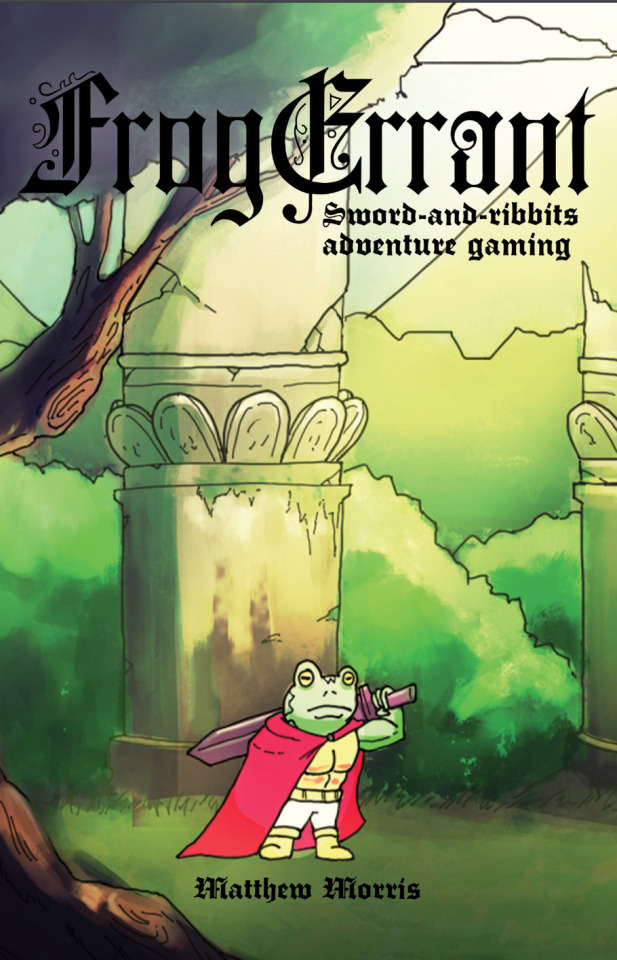
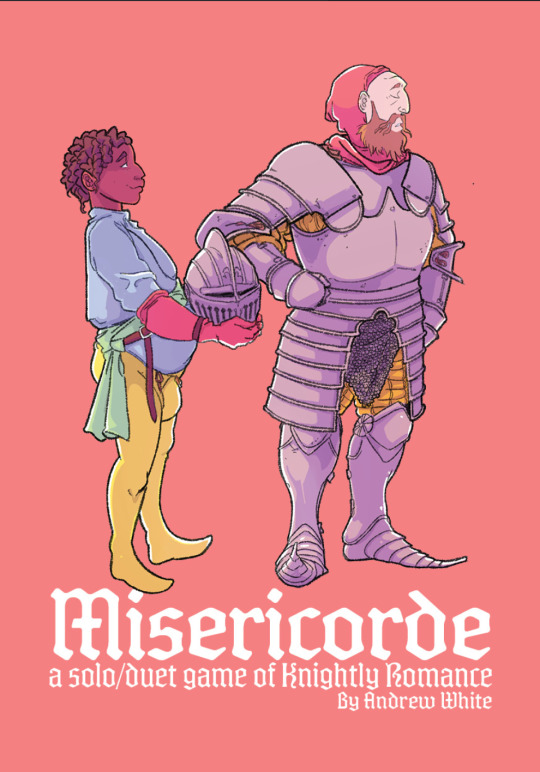
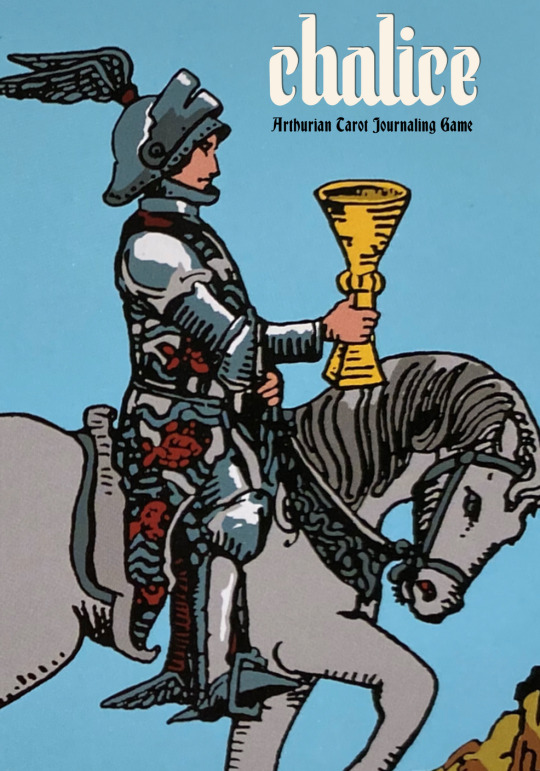
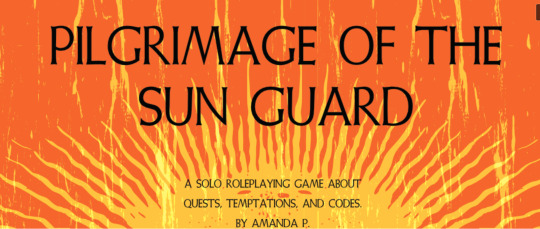
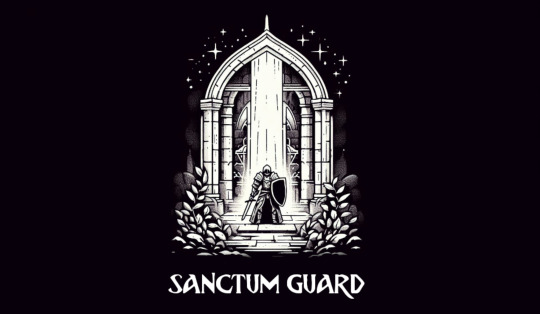
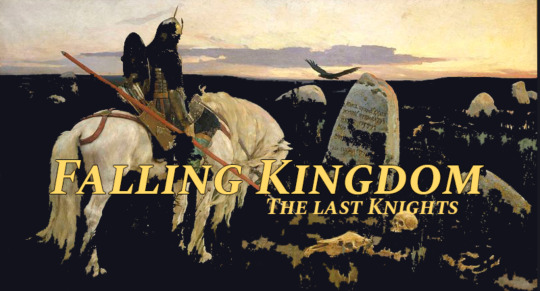

Frog Errant, by ManaDawn Tabletop Games.
It’s a deadly and brutal world out there, and it is not too friendly for a lone frog. But if you embrace your quest and heed the omens, you may just be able to make a name for yourself. And if you wander long and far enough, you may be remembered in the songs of both frogs and mice.
Frog Errant is a solo, or GMless, game mode for Mausritter or other Into the Odd based games. In Frog Errant you will take up the role of a wandering frog knight-errant, seeking adventure, looking to fulfill a Quest - all while avoiding you prophesied Doom.
If you are familiar with Mausritter, then this game will be pretty easy to pick up. The game builds in some story that isn’t present in Mausritter - primarily the Quest that has been given to your frog knight, as well as a Doom that has been prophesied to overcome you. It looks like you can use a lot of the items and monsters from Mausritter, but Frog Errant has plenty of new pieces too!
Misericorde, by Andrew White.
Misericorde is a game of knightly romance, pining, unrequited love and confronting the expected behaviours of your social class. You play as a squire serving under a knight on a great quest, without your assistance they surely will fail and yet, as a squire you are obligated to remain in the background, forgotten and not commented on. However, you have developed feelings, perhaps unrequited, for your knight. The actions of the game focus on this struggle, between your Duty and your Desire. Will you hold back, hew to your duty and rank; or will you break free and open your heart, no matter how your beloved may respond.
You’re not exactly a knight in this game, but rather a squire to one. Misericorde is completely unlike the other games on this list because it focuses on devotion and desire, rather than the actions that a forsworn duty drives a Knight to do. You play the game by setting up scenes, asking questions, and rolling dice on an Oracle to figure out what happens next. This is an interpretive game, so while the Oracle will point you in a direction, you determine what exactly each result means.
Chalice, by Monkey’s Paw Games.
Chalice is a solo journaling role-playing game where you chronicle the perilous journey of a Grail-seeking knight in Arthurian England. During the game, you will tell the story of your Knight’s physical and spiritual descent as they quest for, and ultimately fail to find, the Grail. Your Knight’s quest is doomed. Their chivalric virtues will be surely undone by their fatal flaws and moral shortcomings.
This looks like the most immersive game for Arthurian mythology as a solo game. The game itself is designed to look like a manuscript from medieval times, calligraphy and all. Your Knight has benefits called Passions, key relationships called Bindings, and a fate determined by drawing cards from a tarot deck. Throughout the game, you will draw more cards that serve as prompts, which will give or strike through your Passions and Bindings, and play happens over the span of years. Each year is measured in two parts: the deed, which will be what your character accomplishes, and the Chanson, which is evocative recording of your character’s deeds. When you are unable to fulfill a prompt given to you, your story end
Pilgrimage of the Sun Guard, by Amanda P.
Quests in King Arthur stories are about ideals, conflict and temptation.
Pilgrimage of the Sun Guard is a solo prompt-based journaling game where you create a Sun Guard and travel alone on a quest, attempting to hold to your Code until you reach the end, facing trials and complications along the way.
You are the last Sun Guard. Will you take up the mantle and ride the ancient roads?
Pilgrimage of the Sun Guard follows a cycle of play. You will start by travelling to a new location, and follow the directions according to each location’s prompt. This may involve using or acquiring resources, accomplishing great deeds, and writing a record of what happened with each step of the quest. When you run out of all of your resources, you can choose to either end your quest there, or break your Code to continue. If you like the story of Gawain & the Green Knight, this game might be for you.
Sanctum Guard, by Bulger007.
Sanctum Guard is a 20-minute pen-and-paper solo game about protecting a powerful magic artifact against a horde of night terrors. In this game, you are a lone guardian of a secluded sanctum built to protect the Obsidram, a powerful artifact that can potentially destroy worlds if it falls into the wrong hands.
You live in peace and harmony with the Obsidram while it is hidden in this secret and desolate domain from power-hungry minds. But one night, someone or something finds the way and you see a glimmering portal from which a horde of monsters descends upon you. Will you manage to protect the Obsidram?
This game runs like a tower defense game, and requires a sheet of graph paper to play. You will build your Sanctum randomly, then roll against generated monsters with the hopes that you can take them out before they utterly destroy the Sanctum and take your sacred relic.
This game doesn’t detail who you’re guarding the Obsidram for, although I think you could also substitute the relic for a person, if you want to be guarding someone instead of something.
Falling Kingdom: The Last Knights, by Purple Robed Wizard.
“The lands are shattered, the gods that once held our hand are dead and the beasts are upon us. Our King. killed by his own flesh. All of us, but waiting to follow. But we still stand, we hold our ground as we rot, we are the Last Knights, and we will stand until we last draw breath.”
In Falling Kingdom you control the last Knights of a realm threatened by a great, corrupting and unstoppable force. There is no great victory waiting for you at the end, no songs to be heard. There is only struggle, corruption, betrayal and death. The Kingdom will Fall, but this story isn’t about that, it is about the heroes that face this imminent fall, the Knights of the realm, normal men and women elevated to a position where they will fight for their homelands against all odds.
This is a map-conquering game, with randomly generated missions, a Great Battle that could turn the tides of the war, and a stages of battles depending on how much territory you win or lose. You can accumulate corruption as you play, which is helpful in getting successful rolls, but accrue too much, and your knights begin to die. If you like a game about strategy, tragedy, and abstract warfare, this might be the game for you.
Sentinel, by Meghan Cross.
You are the lone guardian of a place of great power - known to you only as The Sanctuary. Many years you have kept vigil in this place, guarding what is kept within from any and all who come to disrupt it or steal it for themselves.
Sentinel is a solo journaling game about a solitary guardian and the place they are charged with keeping safe. It is a deck and dice based game in which you will create your guardian and the sanctuary that they protect before reliving the memories, facing threats, and finding interesting objects while time passes around you. And then, when the time has come for your watch to end, find out what happens to The Sanctuary when you are no longer able to guard it.
This is a journaling game that uses cards to determine what kinds of actions your character can take. Hearts summon memories, Diamonds grant you items, Spades bring threats, and Clubs pass time. If you draw a Joker, the game is over and the story ends. At the end of the game, the final roll determines whether or not you are successful in your quest. This is a great game for folks who like journaling and world building.
Games I've Recommended in the Past
5-Min Knight, by enui.
Fetch My Blade, by Ethan Yen.
275 notes
·
View notes
Note
[percy would look at him] there is a difference, augur, between harsh training and having to fight for your life ill-prepared and unaware. or have you not heard that before i spent a single day at camp half-blood i was faced with the minotaur, with no training and no weapon [he’d swallow hard, trying not to get more upset] i caused no problems intentionally and most problems because i was trying to get away with my life and spare as many others as i could. regardless of what you may think, the university can see the reality of what ive had to do.
i can’t believe you’re back.
- @s3aweed-brain
"I can't believe you're still kicking."
#OCTAVIAN AT CHB#i’m crying that would be so funny#it would NOT be regimented enough for him he’d lose his mind#he’d also definitely have umbrage with the whole ‘oracle in the dusty old attic’ thing#he’d definitely be muttering in latin#also the fact that apollo in chb is mainly oriented towards the infirmary and archery as opposed to interpretation of prophesy#which is of course mainly because the greeks were like ah yes large overseeing prophesy rather than little prophesies#like augury was something remus and romulus did to decide where to found rome#romans wouldn’t go into battle (even if they knew they had to at some point) if the augurs thought it was not looking good
62 notes
·
View notes